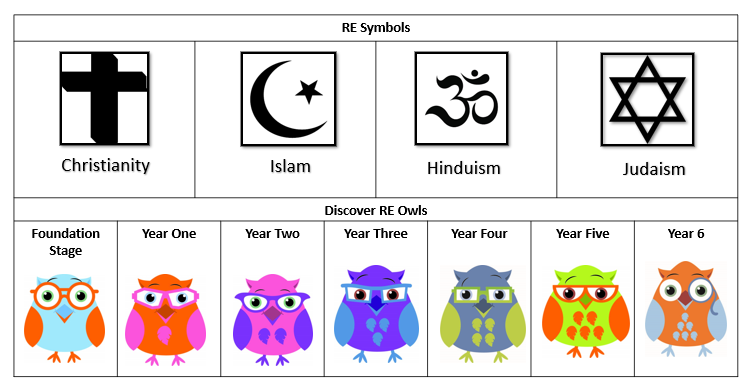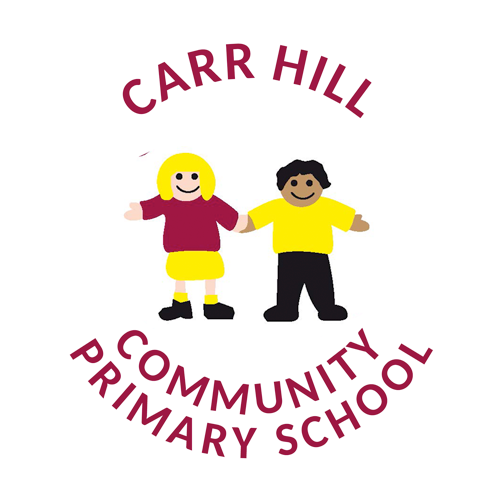Mrs Edge leads the teaching of Religious Education in School.
Our Intent for Religious Education
Here, at Carr Hill Community Primary School, the aim of Religious Education is to help children to acquire and develop knowledge and understanding of Christianity and another three religions represented in Great Britain; to appreciate the way that religious beliefs shape life and our behaviour, develop the ability to make reasoned and informed judgements about religious and moral issues and enhance their spiritual, moral, social and cultural development.
Religious Education is taught throughout the school in such a way as to reflect the overall aims, values, and philosophy of the school. At Carr Hill Community Primary School, Religious Education plays an important role, along with all other curriculum areas, particularly PSHE and SEAL, in promoting the spiritual, moral, social, and cultural development of our children.
Our Implementation for Religious Education
At Carr Hill Community Primary School, it has been agreed that having taken into account the requirements and guidelines presented in the Agreed Syllabus, the following religions have been selected for study:
- Christianity (in each Year group)
- Judaism (Year 1 and 2)
- Islam (Year 3 and 4)
- Hinduism (Year 5 and 6)
As Christianity is the predominant religion in the school’s pupil population and in the community surrounding the school, Christianity is the chosen faith for Progressed Study. It is encouraged that children explore a key idea, engage with the idea and then reflect. Each class has a RE ambassador which allows this to happen frequently.
There are no presumptions made as to the religious backgrounds and beliefs and values of the children and the staff. We value the religious background of all members of the school community and hope that this will encourage individuals to share their own experiences with others freely. All religions and their communities are treated with respect and sensitivity and we value the links, which are, and can be made between home, school, and a faith community. We acknowledge that each religion studied can contribute to the education of all our pupils. We promote teaching in Religious Education that stresses open enquiry and first-hand experiences wherever possible for both staff and children.
Curriculum aims
The role of Religious Education is to help prepare and equip all pupils for life in contemporary Britain by enabling them to acquire a good level of religious literacy. This means to gain an understanding of the diverse beliefs and religious practices of our faith communities, to understand the secular world view held by a number of people in our society, and to respect the right of all people to make these very personal choices.
We believe that pupils should have the opportunity:
TO EXPLORE the teachings, beliefs and practices of the principal faiths and belief systems in our society. This means that, for each of the faiths specified in the syllabus, they should be helped to acquire a core of knowledge and understanding of the key elements of the faith narrative, the principal stories, sacred texts, rituals, symbolism and lifestyles relating to them.
TO ENGAGE with the big questions about our life in the world, our value as people, our identity and our responsibilities. This means that pupils should be helped to respond to the big questions that their experience of life raises and to be able to express their thoughts relating their experiences and responses to those of other individuals and groups.
TO REFLECT on the challenges that are presented by living in a diverse world and to develop the skills and attitudes that enable people to live well by successfully accommodating difference. This means developing the ability to recognise bias, prejudice and discrimination in ourselves and others and to develop the ability to make informed judgements and responsible choices.
Section 375 of the Education Act 1996 requires that the Agreed Syllabus must reflect the fact that religious traditions in Great Britain are for the most part Christian but that the teaching and practices of the other religions represented in Great Britain must be taken into account.
The ‘other religions’ that are specified in the Gateshead Agreed Syllabus are:
In Early Years and Primary:
- Judaism
- Hinduism
- Islam
The Impact of Religious Education
The children at Carr Hill Community Primary enjoying learning lots about other religions and why people choose or choose not to follow a religion. Through their R.E. learning, the children are able to make links between their own lives and those of others in their community and in the wider world. R.E. acts as a hub, therefore, between social aspects of learning, science and geography. Through R.E. our children are developing an understanding of other people’s cultures and ways of life, which they are then able to communicate to the wider community.
R.E. offers our children the means by which to understand how other people choose to live and to understand why they choose to live in that way. As such, R.E. is invaluable in an ever changing and shrinking world.
The Education Reform Act 2002 sets out the central aims of the school curriculum.
They are:
- To promote the spiritual, moral, cultural, mental and physical development of learners at the school and within society; and
- To prepare learners at the school for the opportunities, responsibilities and experiences of adult life.
Religious Education is part of a pupil’s entitlement from Reception through to the end of Sixth Form. All maintained schools are required to provide Religious Education for their pupils and headteachers must ensure that this is done.
We follow Gateshead’s Agreed Religious Education Syllabus: Gateshead-Agreed-Religious-Education-Syllabus-Feb-2018
Our RE Symbols

Progression Steps
Below are links to Carr Hill’s knowledge progression steps for each year group:
Key Stage One
Lower Key Stage Two
Upper Key Stage Two
Planning
Right to Withdraw
Religion and belief have become more visible in public life in recent years, making it important that all pupils should have an opportunity to engage meaningfully in RE. This really helps us to develop communities who understand the key values of tolerance, mutual respect, democracy and individual liberty. However, the parent or carer of a pupil at a community, foundation or voluntary school (or pupils themselves if they are aged 18 or over) may request that they be excused from all or part of the religious education (RE) provided.
Parents or carers who wish to withdraw their children from RE should be aware of its aims and what is covered in the RE curriculum and that they are given the opportunity to discuss this if they wish. It should be made clear whether the withdrawal is from the whole RE curriculum or specific parts of it. No reasons need be given.
Important – limitations to withdrawal from RE in Carr Hill Community Primary School
- If pupils are withdrawn from RE, schools have a duty to supervise them, though not to provide additional teaching. A pupil may be required to work in another area of the school, such as library or break out area.
- Whilst parents or carers have a right to withdraw children from RE, they should note that children may also encounter religions and beliefs and wider aspects of faith in other areas of the curriculum from which there is no right of withdrawal.
- On occasion, spontaneous questions about religious matters are raised by pupils or issues related to religion arise in other curriculum subjects such as history or citizenship (PSHE) for example, schools promote community cohesion and help pupils to understand ideas about identity and diversity, feelings and emotions within both religious and non-religious contexts.
Managing the Right of Withdrawal
If pupils are withdrawn from RE, schools have a duty to supervise them, though not to provide additional teaching or to incur extra cost. Pupils will usually remain on school premises where it is feasible and appropriate.
Where a request for withdrawal is made, the school must comply and excuse the pupil until the request is rescinded. Though not legally required, it is good practice for a head teacher to invite parents or carers into school to discuss their written request.
(Section 71(3), School Standards and Framework Act 1998).

